QUT Business Law and Ethics: Facebook Data Breach Case Study Analysis
VerifiedAdded on 2023/06/08
|6
|1590
|460
Case Study
AI Summary
This case study examines the ethical implications of the Facebook data breach and CEO Mark Zuckerberg's actions. It applies utilitarianism and deontological ethics to evaluate the morality of Facebook's data usage, considering the consequences for stakeholders like Facebook, users, and the government. The study further analyzes Zuckerberg's traits using virtue ethics and Kohlberg's theory of moral development to assess his character and actions in response to the crisis. The analysis considers factors such as compassion, humility, and the stages of moral development to provide a comprehensive understanding of the ethical dimensions of the situation. The case study evaluates the ethical decisions made by Facebook and Zuckerberg's response to the data breach, offering insights into business ethics and leadership.

Business Law and Ethics Case Study
Paraphrase This Document
Need a fresh take? Get an instant paraphrase of this document with our AI Paraphraser
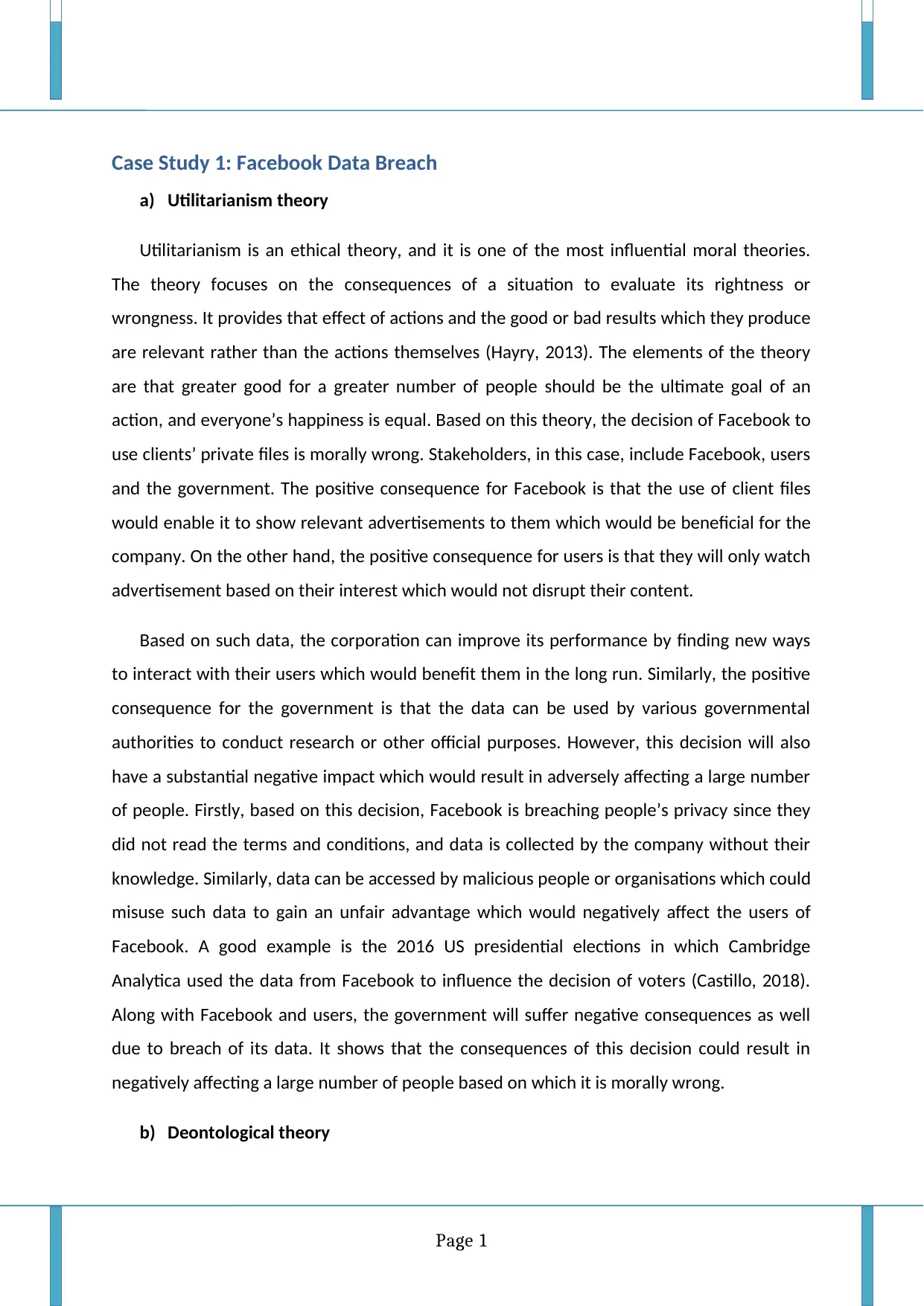
Case Study 1: Facebook Data Breach
a) Utilitarianism theory
Utilitarianism is an ethical theory, and it is one of the most influential moral theories.
The theory focuses on the consequences of a situation to evaluate its rightness or
wrongness. It provides that effect of actions and the good or bad results which they produce
are relevant rather than the actions themselves (Hayry, 2013). The elements of the theory
are that greater good for a greater number of people should be the ultimate goal of an
action, and everyone’s happiness is equal. Based on this theory, the decision of Facebook to
use clients’ private files is morally wrong. Stakeholders, in this case, include Facebook, users
and the government. The positive consequence for Facebook is that the use of client files
would enable it to show relevant advertisements to them which would be beneficial for the
company. On the other hand, the positive consequence for users is that they will only watch
advertisement based on their interest which would not disrupt their content.
Based on such data, the corporation can improve its performance by finding new ways
to interact with their users which would benefit them in the long run. Similarly, the positive
consequence for the government is that the data can be used by various governmental
authorities to conduct research or other official purposes. However, this decision will also
have a substantial negative impact which would result in adversely affecting a large number
of people. Firstly, based on this decision, Facebook is breaching people’s privacy since they
did not read the terms and conditions, and data is collected by the company without their
knowledge. Similarly, data can be accessed by malicious people or organisations which could
misuse such data to gain an unfair advantage which would negatively affect the users of
Facebook. A good example is the 2016 US presidential elections in which Cambridge
Analytica used the data from Facebook to influence the decision of voters (Castillo, 2018).
Along with Facebook and users, the government will suffer negative consequences as well
due to breach of its data. It shows that the consequences of this decision could result in
negatively affecting a large number of people based on which it is morally wrong.
b) Deontological theory
Page 1
a) Utilitarianism theory
Utilitarianism is an ethical theory, and it is one of the most influential moral theories.
The theory focuses on the consequences of a situation to evaluate its rightness or
wrongness. It provides that effect of actions and the good or bad results which they produce
are relevant rather than the actions themselves (Hayry, 2013). The elements of the theory
are that greater good for a greater number of people should be the ultimate goal of an
action, and everyone’s happiness is equal. Based on this theory, the decision of Facebook to
use clients’ private files is morally wrong. Stakeholders, in this case, include Facebook, users
and the government. The positive consequence for Facebook is that the use of client files
would enable it to show relevant advertisements to them which would be beneficial for the
company. On the other hand, the positive consequence for users is that they will only watch
advertisement based on their interest which would not disrupt their content.
Based on such data, the corporation can improve its performance by finding new ways
to interact with their users which would benefit them in the long run. Similarly, the positive
consequence for the government is that the data can be used by various governmental
authorities to conduct research or other official purposes. However, this decision will also
have a substantial negative impact which would result in adversely affecting a large number
of people. Firstly, based on this decision, Facebook is breaching people’s privacy since they
did not read the terms and conditions, and data is collected by the company without their
knowledge. Similarly, data can be accessed by malicious people or organisations which could
misuse such data to gain an unfair advantage which would negatively affect the users of
Facebook. A good example is the 2016 US presidential elections in which Cambridge
Analytica used the data from Facebook to influence the decision of voters (Castillo, 2018).
Along with Facebook and users, the government will suffer negative consequences as well
due to breach of its data. It shows that the consequences of this decision could result in
negatively affecting a large number of people based on which it is morally wrong.
b) Deontological theory
Page 1
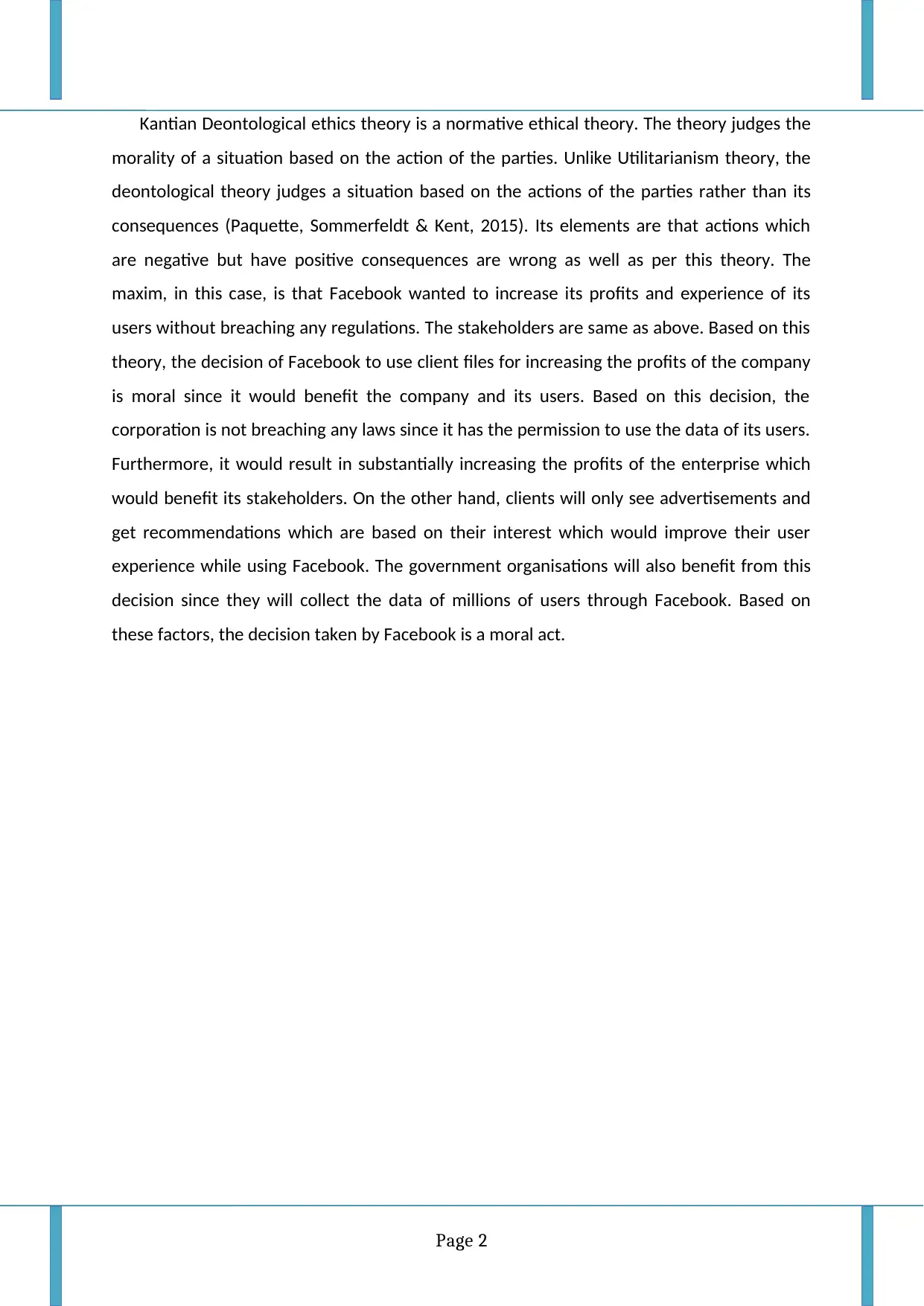
Kantian Deontological ethics theory is a normative ethical theory. The theory judges the
morality of a situation based on the action of the parties. Unlike Utilitarianism theory, the
deontological theory judges a situation based on the actions of the parties rather than its
consequences (Paquette, Sommerfeldt & Kent, 2015). Its elements are that actions which
are negative but have positive consequences are wrong as well as per this theory. The
maxim, in this case, is that Facebook wanted to increase its profits and experience of its
users without breaching any regulations. The stakeholders are same as above. Based on this
theory, the decision of Facebook to use client files for increasing the profits of the company
is moral since it would benefit the company and its users. Based on this decision, the
corporation is not breaching any laws since it has the permission to use the data of its users.
Furthermore, it would result in substantially increasing the profits of the enterprise which
would benefit its stakeholders. On the other hand, clients will only see advertisements and
get recommendations which are based on their interest which would improve their user
experience while using Facebook. The government organisations will also benefit from this
decision since they will collect the data of millions of users through Facebook. Based on
these factors, the decision taken by Facebook is a moral act.
Page 2
morality of a situation based on the action of the parties. Unlike Utilitarianism theory, the
deontological theory judges a situation based on the actions of the parties rather than its
consequences (Paquette, Sommerfeldt & Kent, 2015). Its elements are that actions which
are negative but have positive consequences are wrong as well as per this theory. The
maxim, in this case, is that Facebook wanted to increase its profits and experience of its
users without breaching any regulations. The stakeholders are same as above. Based on this
theory, the decision of Facebook to use client files for increasing the profits of the company
is moral since it would benefit the company and its users. Based on this decision, the
corporation is not breaching any laws since it has the permission to use the data of its users.
Furthermore, it would result in substantially increasing the profits of the enterprise which
would benefit its stakeholders. On the other hand, clients will only see advertisements and
get recommendations which are based on their interest which would improve their user
experience while using Facebook. The government organisations will also benefit from this
decision since they will collect the data of millions of users through Facebook. Based on
these factors, the decision taken by Facebook is a moral act.
Page 2
⊘ This is a preview!⊘
Do you want full access?
Subscribe today to unlock all pages.

Trusted by 1+ million students worldwide
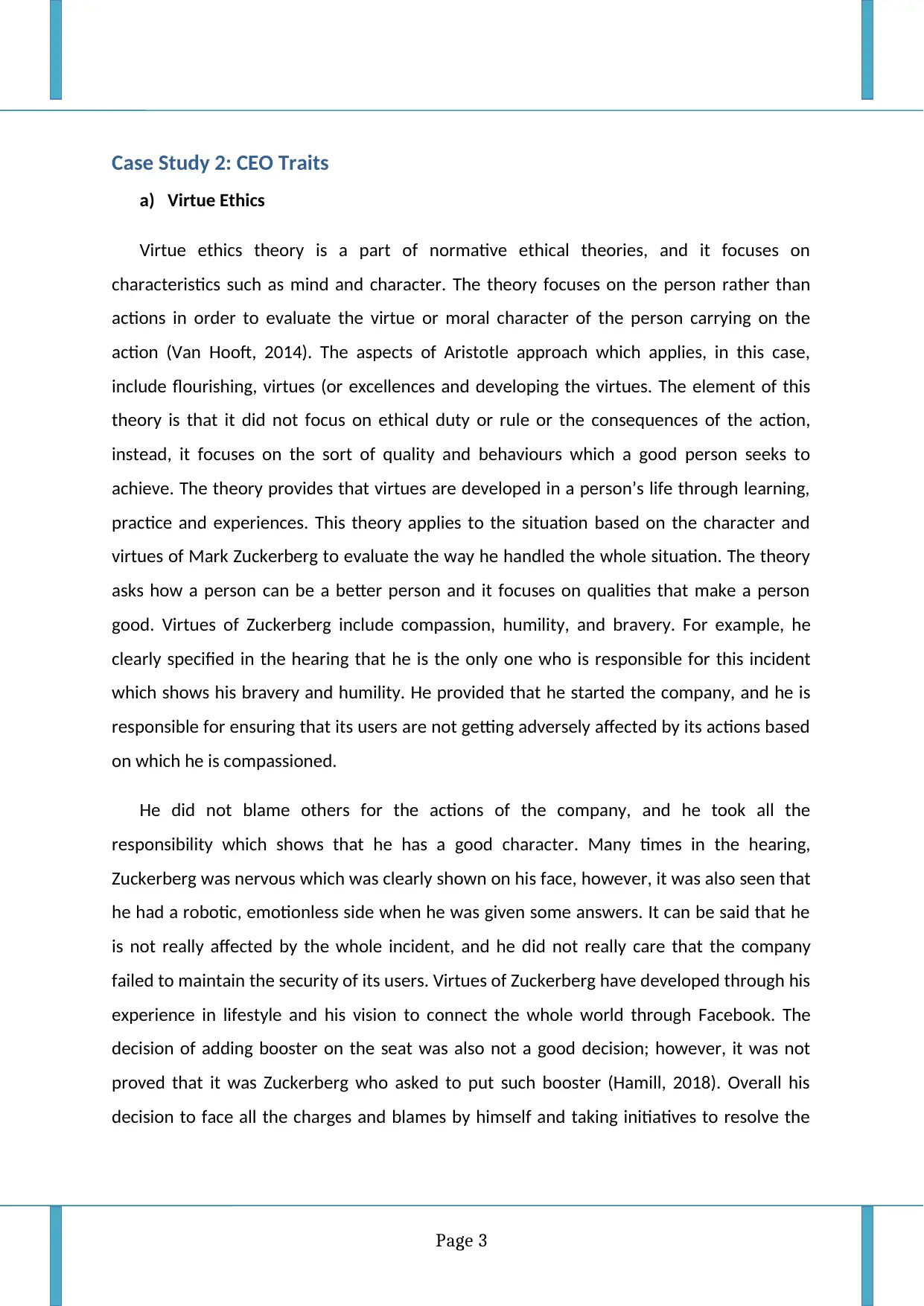
Case Study 2: CEO Traits
a) Virtue Ethics
Virtue ethics theory is a part of normative ethical theories, and it focuses on
characteristics such as mind and character. The theory focuses on the person rather than
actions in order to evaluate the virtue or moral character of the person carrying on the
action (Van Hooft, 2014). The aspects of Aristotle approach which applies, in this case,
include flourishing, virtues (or excellences and developing the virtues. The element of this
theory is that it did not focus on ethical duty or rule or the consequences of the action,
instead, it focuses on the sort of quality and behaviours which a good person seeks to
achieve. The theory provides that virtues are developed in a person’s life through learning,
practice and experiences. This theory applies to the situation based on the character and
virtues of Mark Zuckerberg to evaluate the way he handled the whole situation. The theory
asks how a person can be a better person and it focuses on qualities that make a person
good. Virtues of Zuckerberg include compassion, humility, and bravery. For example, he
clearly specified in the hearing that he is the only one who is responsible for this incident
which shows his bravery and humility. He provided that he started the company, and he is
responsible for ensuring that its users are not getting adversely affected by its actions based
on which he is compassioned.
He did not blame others for the actions of the company, and he took all the
responsibility which shows that he has a good character. Many times in the hearing,
Zuckerberg was nervous which was clearly shown on his face, however, it was also seen that
he had a robotic, emotionless side when he was given some answers. It can be said that he
is not really affected by the whole incident, and he did not really care that the company
failed to maintain the security of its users. Virtues of Zuckerberg have developed through his
experience in lifestyle and his vision to connect the whole world through Facebook. The
decision of adding booster on the seat was also not a good decision; however, it was not
proved that it was Zuckerberg who asked to put such booster (Hamill, 2018). Overall his
decision to face all the charges and blames by himself and taking initiatives to resolve the
Page 3
a) Virtue Ethics
Virtue ethics theory is a part of normative ethical theories, and it focuses on
characteristics such as mind and character. The theory focuses on the person rather than
actions in order to evaluate the virtue or moral character of the person carrying on the
action (Van Hooft, 2014). The aspects of Aristotle approach which applies, in this case,
include flourishing, virtues (or excellences and developing the virtues. The element of this
theory is that it did not focus on ethical duty or rule or the consequences of the action,
instead, it focuses on the sort of quality and behaviours which a good person seeks to
achieve. The theory provides that virtues are developed in a person’s life through learning,
practice and experiences. This theory applies to the situation based on the character and
virtues of Mark Zuckerberg to evaluate the way he handled the whole situation. The theory
asks how a person can be a better person and it focuses on qualities that make a person
good. Virtues of Zuckerberg include compassion, humility, and bravery. For example, he
clearly specified in the hearing that he is the only one who is responsible for this incident
which shows his bravery and humility. He provided that he started the company, and he is
responsible for ensuring that its users are not getting adversely affected by its actions based
on which he is compassioned.
He did not blame others for the actions of the company, and he took all the
responsibility which shows that he has a good character. Many times in the hearing,
Zuckerberg was nervous which was clearly shown on his face, however, it was also seen that
he had a robotic, emotionless side when he was given some answers. It can be said that he
is not really affected by the whole incident, and he did not really care that the company
failed to maintain the security of its users. Virtues of Zuckerberg have developed through his
experience in lifestyle and his vision to connect the whole world through Facebook. The
decision of adding booster on the seat was also not a good decision; however, it was not
proved that it was Zuckerberg who asked to put such booster (Hamill, 2018). Overall his
decision to face all the charges and blames by himself and taking initiatives to resolve the
Page 3
Paraphrase This Document
Need a fresh take? Get an instant paraphrase of this document with our AI Paraphraser
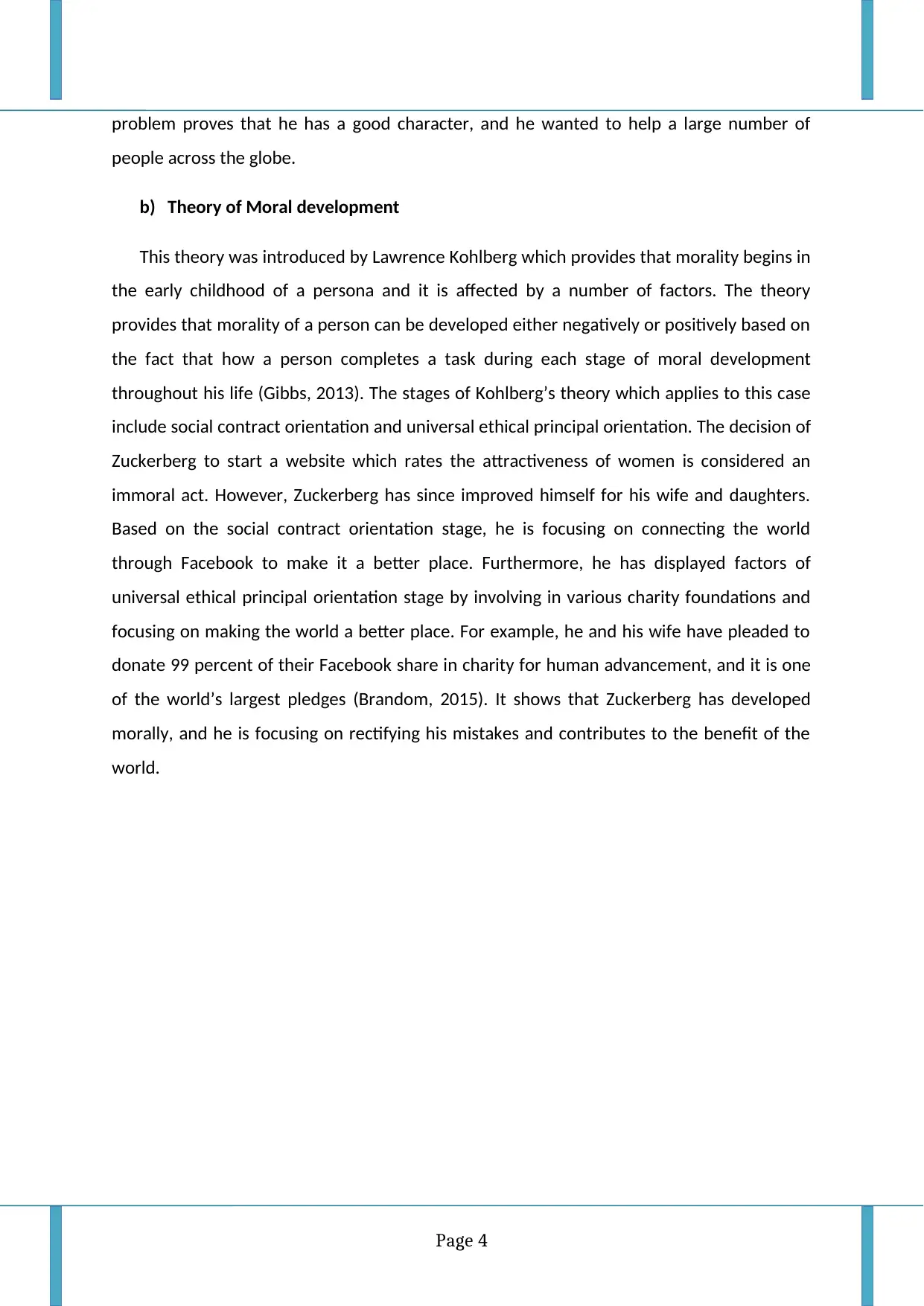
problem proves that he has a good character, and he wanted to help a large number of
people across the globe.
b) Theory of Moral development
This theory was introduced by Lawrence Kohlberg which provides that morality begins in
the early childhood of a persona and it is affected by a number of factors. The theory
provides that morality of a person can be developed either negatively or positively based on
the fact that how a person completes a task during each stage of moral development
throughout his life (Gibbs, 2013). The stages of Kohlberg’s theory which applies to this case
include social contract orientation and universal ethical principal orientation. The decision of
Zuckerberg to start a website which rates the attractiveness of women is considered an
immoral act. However, Zuckerberg has since improved himself for his wife and daughters.
Based on the social contract orientation stage, he is focusing on connecting the world
through Facebook to make it a better place. Furthermore, he has displayed factors of
universal ethical principal orientation stage by involving in various charity foundations and
focusing on making the world a better place. For example, he and his wife have pleaded to
donate 99 percent of their Facebook share in charity for human advancement, and it is one
of the world’s largest pledges (Brandom, 2015). It shows that Zuckerberg has developed
morally, and he is focusing on rectifying his mistakes and contributes to the benefit of the
world.
Page 4
people across the globe.
b) Theory of Moral development
This theory was introduced by Lawrence Kohlberg which provides that morality begins in
the early childhood of a persona and it is affected by a number of factors. The theory
provides that morality of a person can be developed either negatively or positively based on
the fact that how a person completes a task during each stage of moral development
throughout his life (Gibbs, 2013). The stages of Kohlberg’s theory which applies to this case
include social contract orientation and universal ethical principal orientation. The decision of
Zuckerberg to start a website which rates the attractiveness of women is considered an
immoral act. However, Zuckerberg has since improved himself for his wife and daughters.
Based on the social contract orientation stage, he is focusing on connecting the world
through Facebook to make it a better place. Furthermore, he has displayed factors of
universal ethical principal orientation stage by involving in various charity foundations and
focusing on making the world a better place. For example, he and his wife have pleaded to
donate 99 percent of their Facebook share in charity for human advancement, and it is one
of the world’s largest pledges (Brandom, 2015). It shows that Zuckerberg has developed
morally, and he is focusing on rectifying his mistakes and contributes to the benefit of the
world.
Page 4
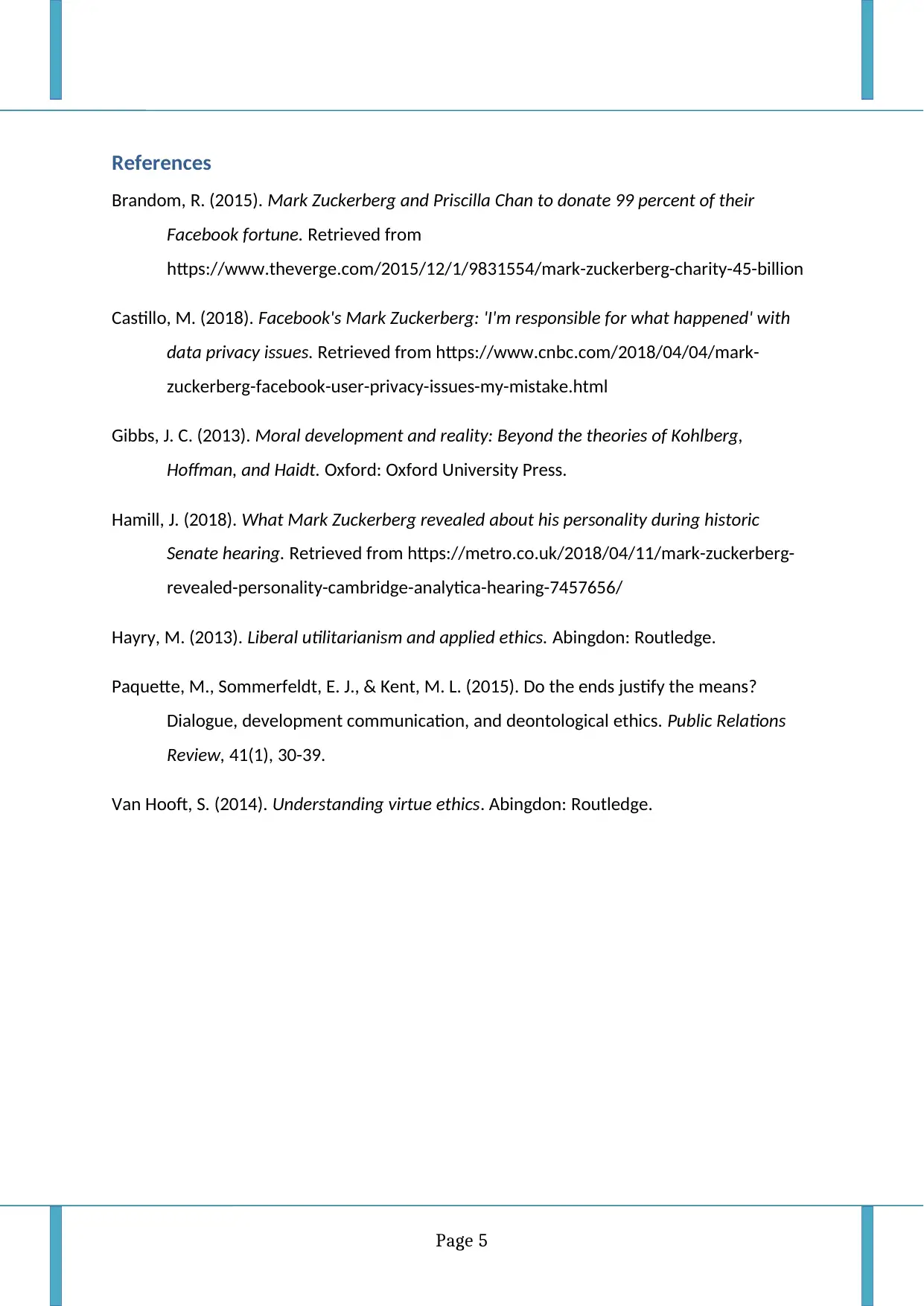
References
Brandom, R. (2015). Mark Zuckerberg and Priscilla Chan to donate 99 percent of their
Facebook fortune. Retrieved from
https://www.theverge.com/2015/12/1/9831554/mark-zuckerberg-charity-45-billion
Castillo, M. (2018). Facebook's Mark Zuckerberg: 'I'm responsible for what happened' with
data privacy issues. Retrieved from https://www.cnbc.com/2018/04/04/mark-
zuckerberg-facebook-user-privacy-issues-my-mistake.html
Gibbs, J. C. (2013). Moral development and reality: Beyond the theories of Kohlberg,
Hoffman, and Haidt. Oxford: Oxford University Press.
Hamill, J. (2018). What Mark Zuckerberg revealed about his personality during historic
Senate hearing. Retrieved from https://metro.co.uk/2018/04/11/mark-zuckerberg-
revealed-personality-cambridge-analytica-hearing-7457656/
Hayry, M. (2013). Liberal utilitarianism and applied ethics. Abingdon: Routledge.
Paquette, M., Sommerfeldt, E. J., & Kent, M. L. (2015). Do the ends justify the means?
Dialogue, development communication, and deontological ethics. Public Relations
Review, 41(1), 30-39.
Van Hooft, S. (2014). Understanding virtue ethics. Abingdon: Routledge.
Page 5
Brandom, R. (2015). Mark Zuckerberg and Priscilla Chan to donate 99 percent of their
Facebook fortune. Retrieved from
https://www.theverge.com/2015/12/1/9831554/mark-zuckerberg-charity-45-billion
Castillo, M. (2018). Facebook's Mark Zuckerberg: 'I'm responsible for what happened' with
data privacy issues. Retrieved from https://www.cnbc.com/2018/04/04/mark-
zuckerberg-facebook-user-privacy-issues-my-mistake.html
Gibbs, J. C. (2013). Moral development and reality: Beyond the theories of Kohlberg,
Hoffman, and Haidt. Oxford: Oxford University Press.
Hamill, J. (2018). What Mark Zuckerberg revealed about his personality during historic
Senate hearing. Retrieved from https://metro.co.uk/2018/04/11/mark-zuckerberg-
revealed-personality-cambridge-analytica-hearing-7457656/
Hayry, M. (2013). Liberal utilitarianism and applied ethics. Abingdon: Routledge.
Paquette, M., Sommerfeldt, E. J., & Kent, M. L. (2015). Do the ends justify the means?
Dialogue, development communication, and deontological ethics. Public Relations
Review, 41(1), 30-39.
Van Hooft, S. (2014). Understanding virtue ethics. Abingdon: Routledge.
Page 5
⊘ This is a preview!⊘
Do you want full access?
Subscribe today to unlock all pages.

Trusted by 1+ million students worldwide
1 out of 6
Related Documents
Your All-in-One AI-Powered Toolkit for Academic Success.
+13062052269
info@desklib.com
Available 24*7 on WhatsApp / Email
![[object Object]](/_next/static/media/star-bottom.7253800d.svg)
Unlock your academic potential
Copyright © 2020–2026 A2Z Services. All Rights Reserved. Developed and managed by ZUCOL.





